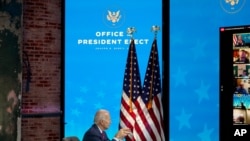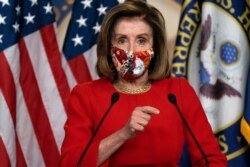President-elect Joe Biden is predicting a "bleak future" if Congress doesn't take speedy action on a coronavirus aid bill, amid a nationwide spike in the virus that's hampering the nation's recovery.
Biden delivered remarks Friday afternoon reacting to November's national jobs report, which showed a sharp decrease in U.S. hiring even as the nation is about 10 million jobs below pre-pandemic levels. The Democrat called the report "dire" and said it "shows the economy is stalling," but he said quick action from Congress can halt some of the damage.
"If we act now, I mean now, we can begin to regain momentum and start to build back a better future," he said. "There's no time to lose."
Surging cases of the virus have led states and municipalities to roll back their re-opening plans. And more restrictions may be on the way as colder temperatures and holiday travel lead to new records for confirmed cases and deaths.
While Biden has thrown his support behind a bipartisan economic relief bill of about $900 billion, he has called it just a "down payment" and has said much more will be needed once he takes office next year. On Friday, he said he and his team have been consulting with labor leaders, CEOs, mayors and governors in crafting their own coronavirus aid bill, which will be his first legislative priority as president.
"The fight against COVID won't be won in January alone," he said.
Biden expressed optimism he'll be able to cut a deal with Republicans when he takes office, but he's certain to face a heavy lift in navigating any bill through a closely divided Senate. Democrats and Republicans have been deadlocked on a coronavirus aid bill for months, with Republicans opposed to a previous, more expensive bill that passed the House.
Biden himself said Friday that he plans to ask Congress for funding for expanded testing, vaccine distribution — which he's said would be an expensive proposition — as well as jobless aid and help for those at risk of eviction. But he still expressed optimism at his ability to work with Republicans, because "the country's gonna be in dire, dire, dire straits if they don't."
Earlier Friday, House Speaker Nancy Pelosi gave an optimistic assessment of the prospects for a midsized COVID-19 relief bill and a separate $1.4 trillion governmentwide spending bill.
Pelosi told reporters that she and Senate Majority Leader Mitch McConnell are in sync on a plan to reach agreement on the massive omnibus spending bill and to add COVID-19 relief to it.
Pelosi said a bipartisan, middle-of-the-road plan being finalized by a diverse group of senators that she has endorsed as a foundation for the relief bill is a good effort, even though it's a significant retreat from where Democrats stood before the election.
Pelosi and McConnell often fight, but they are an unstoppable force when their interests align. They spoke on the phone Thursday, a conversation that came the day after Pelosi signaled a willingness to make major concessions in search of a COVID-19 rescue package in the $1 trillion range.
“We had a good conversation. I think we’re both interested in getting an outcome, both on the omnibus and on a coronavirus package,” McConnell said Thursday.





